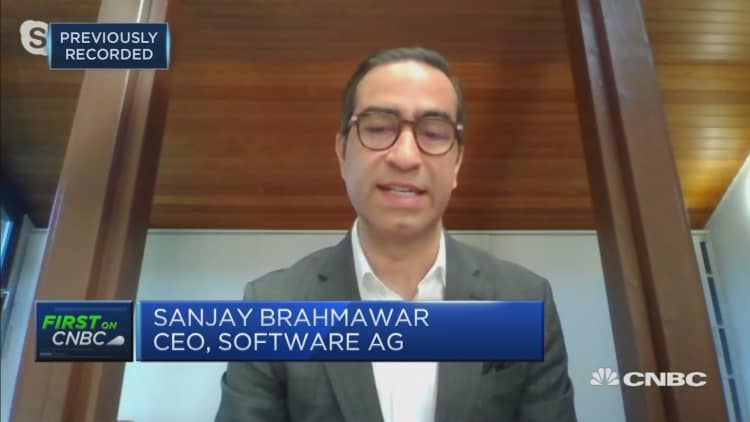With many technology funds back to break-even and the Nasdaq leading the major equity indices back up after the market rout that began in February, there's a conventional wisdom about why: Software is so important to modern business that companies will do almost anything to keep buying and using it.
But what if that's not completely true? Software companies were little affected by the 2008 financial crisis. But that confidence, and immunity from corporate enterprise IT budget rethinks, is less likely to be duplicated this time.
The market's rising confidence that software will be OK in the coronavirus recession will be tested as companies begin reporting earnings, highlighted this week by Microsoft and Amazon.com, which now makes most of its profit from its cloud-computing business, which is, at its bottom, a new-technology means of distributing software.
Economic hardship and bankruptcies
The question was raised in a provocative essay by Boston fund manager Gavin Baker of Atreides Management. Baker argues that the market may be overstating just how insulated software companies are from the economic fallout of coronavirus. While companies may not cancel software contracts, Baker wrote on Medium.com, many companies could still be vulnerable to losing revenue as clients pay less for per-seat software licenses adjusted for layoffs at the clients' companies, spend less for support services for software they already own and seek more lenient payment terms.
Billionaire private equity CEO Robert Smith of Vista Equity Partners, which has had success investing in software vendors, has remarked in the past that "software contracts are better than first-lien debt."
But Baker worries there will be "a lot of economic hardship and bankruptcies. Regardless of how long this economic hard stop lasts, I don't believe anyone — investor or executive — underwrote the scenario we are living through."
The longer-run issues in software point to risks that the current crisis is likely to accentuate and accelerate, said analyst John Freeman at CFRA Research.
Chief among them is the shift from packaged software, typically sold with a hefty upfront payment and then an ongoing stream of service revenue, to software-as-a-service business models that take less money up front but charge more per month over time.
The leader in this business has long been Salesforce.com, but most newer software companies have adopted the pay-as-you-go model in software niches from human resources management, such as Workday, to collaboration software, including Atlassian and other start-ups, and even home video meetings through Zoom Video Communications, whose shares have more than doubled this year as Zoom meetings replaced in-person schooling and many corporate meetings.

"You have to think about what happens to a new model in an economic downturn," Freeman said "Downturns favor trends that have been held back by inertia.''
Software integrated into the cloud computing services have helped turn Microsoft and Amazon into trillion-dollar companies, Freeman said. As the market rebounded from its March lows, investors have resumed big bets on the market's biggest technology companies, including Microsoft and Amazon, which together with Apple, Facebook and Alphabet now make up more than 20% of the S&P 500.
The 2008 bust was good for software-as-a-service leader Salesforce.com, and cloud companies will see their market share growth accelerate this time. But if Baker's right, that's bad news for packaged-software players, the highest profile of which remain Oracle and SAP. Oracle has regained all of its 2020 losses and boasted a big win this week when Zoom chose it over Microsoft and Amazon for cloud services, but it has been outstripped by gains in those two cloud-hosting giants. SAP shares are down this year.
Year-to-date the software and services subsector of the S&P 500 is negative by roughly 10%, but that's only half the level of decline in the U.S. stock market's tech hardware subsector, down roughly 20% through April 28.
"If you're a multinational legacy software company and you have traditional sales practices, those aren't possible right now," said Scott Kessler, an analyst at New York-based investment-research firm Third Bridge.
SAP said in a statement to CNBC some customers that had planned for on-premise enterprise solutions are now thinking about going fully to the cloud and the pay-as-you-go model of its S/4HANA Cloud product for some previously planned acquisitions. In some cases, that is because of difficulty getting individuals to facilities. SAP regional businesses were also guided to make concessions for customers on a case-by-case basis, with the power to adjust date, payment terms and start dates for subscriptions.
"A lot of enterprises these days have to — have to overcome some liquidity challenges," SAP CEO Christian Klein indicated on its Q1 earnings calls, but he added that companies will also be making purchase decisions in the future based on building more intelligent supply chains "to be more resilient in such a crisis," and there is a lot of market potential in that shift.
Salesforce and Oracle did not respond to requests for comment by press time.
Simon Moss, CEO of Redwood City, California-based artificial intelligence company Symphony Ayasdi, said a company like Amazon is in a good place because the "distributed" nature of life in the cloud plays to its strengths. But he thinks the perception of software invincibility may have contributed to an inflation of software start-up valuations and allowed less essential companies to float along when debt was cheap.
Customers are now dealing with unexpected short-term expenses while also trying to preserve cash, two things that don't work together. As a firm selling its software to larger companies in the financial services sector, his biggest task right now, and it's the same for every software start-up, Moss thinks, is to justify the essential nature of what it can offer clients.
Software a much bigger part of economy
Software is a bigger part of the broad economy now, and because this downturn is affecting a broader swath of industries than the housing-and-finance-focused 2008–2009 bust, it will pose greater risks to software companies as their clients suffer.
John Rymer, cloud analyst at technology consulting firm Forrester Research, said in a recession the focus shifts to cost and optimization rather than innovation and growth. Companies have to take out the sharp pencil and look at expense reductions.
Over the next few months, in a world in which mortgage payments, taxes and student interest payments are being deferred, I'm not sure that software companies will be able to insist on payment or that it would be wise to do so.Gavin BakerBoston fund manager, Atreides Management
"That is definitely going on, and will be greatest in industries hit hardest by this crisis, such as hotels, travel and retail," he said. "Companies will look to renegotiate contracts and may look to reduce the overall number of software vendors they work with as a way to save money and also gain discounts from consolidating business with one technology firm. ... All these contracts have provisions to allow for renegotiation."
The cloud giants have been working with some customers on financial relief during the past few months.
Small- to medium-sized businesses, whose cash flow has been cut off in some cases due to state mandates to close, and by customer apprehensiveness in others, will be in a difficult spot, Baker of Atreides Management wrote. Less at risk are vendors serving industries that have been able to transition staffers to working from home, still using their office software. Software companies that charge by the number of users, or amount of usage, should see drops that reflect the decline in economic activity, he said.
"Over the next few months, in a world in which mortgage payments, taxes and student interest payments are being deferred, I'm not sure that software companies will be able to insist on payment or that it would be wise to do so," Baker said. "As bad as worsening payment terms might be for some software companies, the software industry would not want governments to begin including software bills on their list of expenses for which deferral is mandated."






